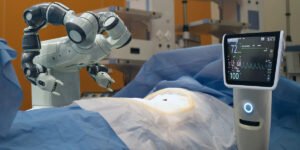Artificial intelligence (AI) is bringing many changes to healthcare. One area where these changes are particularly striking is dermatology. The combination of advanced technology and the complex world of skin health is changing the way we diagnose and treat skin problems. The article, titled ‘Skin Deep Tech’, discusses how artificial intelligence is changing dermatology by making it easier to diagnose skin problems and create personalized treatment plans.
Skin as a Canvas: Unique Problems in Dermatology
1. Visual Complexity
Dermatology is a field of view and many skin conditions have subtle symptoms that can make a proper diagnosis difficult. Skin problems are hard to detect, so you need a good eye and, increasingly, new technology to help.
2. Different Skin Types
People come in many different skin colors. Dermatologists have to deal with complex problems that arise because people of different races and backgrounds have different skin problems.
3. Cases of Skin Diseases
With skin problems becoming more common around the world, dermatology is in high demand. To cope with the increase in cases, we must find new ways to diagnose, treat and manage patients.
Application of Artificial Intelligence in Dermatology:
1. Computer Image Analysis
It turns out that AI systems are very good at looking at photos of skin conditions and lesions. These algorithms can quickly and accurately view visual data such as moles and rashes, providing dermatologists with useful information.
2. Detect Skin Cancer Early
Melanoma and other forms of skin cancer are major problems. Artificial intelligence tools are ideal for the early detection of suspicious lesions. They do this by quickly and accurately assessing the situation, leading to early treatment and better outcomes.
3. Help Dermatologists Diagnose
Dermatologists can now get better diagnostic help through artificial intelligence tools. The purpose of these tools is to help healthcare professionals find patterns, analyze image data, and obtain more information to improve their clinical knowledge.
Practical Applications of Artificial Intelligence:
1. Apps to Check for Skin Cancer
Recently, artificial intelligence mobile apps have emerged that allow users to quickly check for blemishes and other skin problems. These apps use artificial intelligence algorithms to determine how dangerous something is and encourage users to seek professional medical advice when necessary.
2. Dermoscopic Analysis
AI analysis helps with dermoscopy, a form of imaging used in dermatology. Algorithms can look at dermoscopy photos and help distinguish between benign and malignant growths with great accuracy.
3. A Customized Treatment Plan
Artificial intelligence makes personalized treatment plans for skin problems possible. Artificial intelligence can suggest the most effective personalized treatment plan with the fewest side effects by looking at patient data, such as genetic information and treatment effects.
How to Solve Dermatological Problems with Artificial Intelligence?
1. Data Security and Privacy
When artificial intelligence is used in dermatology, it looks at photos of sensitive patients. To protect patient information and enable people to trust these technologies, it is important to ensure strong data privacy and security measures are in place.
2. Understand the Skin Characteristics of different Cultures
Artificial intelligence algorithms should be taught using a wide range of data sets, including people with different skin colors and types. Taking on the task of figuring out how to interpret skin characteristics that differ from culture to culture will ensure that artificial intelligence in dermatology works well for a variety of populations.
3. Ensure Ethical Use
Responsibly promoting skin assessment applications, obtaining informed consent for AI-assisted diagnoses, and setting clear rules for the ethical use of patient data to train AI algorithms are all ethical issues to consider in AI dermatology.
The Future of Dermatology:
1. Teledermatology Consultation
Artificial intelligence is helping dermatology remotely by allowing doctors to perform remote assessments. Dermatologists can use AI-assisted diagnostics to virtually examine skin conditions, providing timely help to patients who may not be able to seek immediate medical attention.
2. What and How Dermatologists Study
As a way of teaching and learning, artificial intelligence can be very useful for doctors. New medical personnel can better diagnose skin problems by using training modules that include artificial intelligence analysis of dermatological images.
3. Connect to Your Electronic Patient Record (EPD)
Adding artificial intelligence to electronic health records could make it easier to capture and analyze dermatological information. By having a complete understanding of the health of a patient’s skin over time, it is easier to provide comprehensive care to patients.
Challenges on the Horizon:
1. Supervision by Supervisors
As artificial intelligence is increasingly used in dermatology, clear government regulation is needed. It is important to establish rules for the ethical use, approval, and oversight of artificial intelligence tools in dermatology.
2. Educate Patients and Gain their Trust
As artificial intelligence is increasingly used in dermatology, it is important that patients understand how it works. To build trust in these technologies, we need to be clear about how AI is used, its limitations, and how AI-enabled dermatology works as a team effort.
3. Eliminate Socio-Economic Disparities
It is difficult to ensure that everyone has equal access to AI-powered dermatology tools. To prevent technology from worsening healthcare inequities, steps must be taken to address social problems.
Conclusion:
The application of artificial intelligence in skin care is a major advancement in healthcare. These tools can improve dermatological care and help patients achieve better outcomes, from the early detection of skin cancer to the development of personalized treatment plans. As we enter a new era of ‘shallow technology’, it is important to consider ethical issues, ensure regulatory oversight and prioritize patient education to get the best out of artificial intelligence or dermatological practices while achieving the highest maintain standards. There is more to the future of dermatology than meets the eye. It is closely related to the endless possibilities that artificial intelligence brings in the field of healthcare innovation.
FAQs:
1. How can artificial intelligence promote the early detection of skin cancer?
Artificial intelligence helps detect skin cancer early by analyzing images of moles and lesions. The algorithms quickly and accurately identify suspicious patterns and provide valuable insights for timely intervention and better outcomes.
2. Can individuals use artificial intelligence applications to self-assess skin conditions?
Yes, there are mobile apps that use artificial intelligence to allow users to perform an initial self-assessment of moles and skin lesions. These apps use artificial intelligence algorithms to provide risk assessments and encourage users to seek professional medical advice when necessary.
3. How does AI provide personalized treatment plans in dermatology?
Artificial intelligence develops personalized treatment plans by analyzing patient data, including genetic information and treatment responses. This allows artificial intelligence to recommend tailored interventions to optimize outcomes for individual patients and minimize side effects.
4. What challenges does artificial intelligence face in dermatology, especially when interpreting different skin characteristics?
Artificial intelligence algorithms need to be trained on a variety of data sets to accurately interpret different skin types and tones. Addressing this challenge can ensure the effectiveness of artificial intelligence in dermatology, regardless of ethnic groups and backgrounds.
5. How can dermatologists use artificial intelligence to conduct remote dermatology consultations?
Dermatologists can use artificial intelligence to support diagnosis and carry out dermatological consultations remotely. Artificial intelligence can virtually assess skin conditions and provide timely recommendations to patients who may not have immediate access to in-person care.



